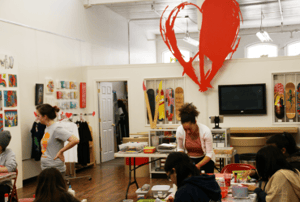Posted: Monday, March 23, 2015
 The Providence Center’s Adolescent Partial Hospitalization Program (Adolescent PHP) presents teenagers with a unique opportunity – they talk while adults listen. For these young people, it is a welcomed change from their typical teenage routine in which they are faced with seemingly constant rhetoric from parents, teachers and coaches.
The Providence Center’s Adolescent Partial Hospitalization Program (Adolescent PHP) presents teenagers with a unique opportunity – they talk while adults listen. For these young people, it is a welcomed change from their typical teenage routine in which they are faced with seemingly constant rhetoric from parents, teachers and coaches.
This client-centered program provides intervention, stabilization and treatment for adolescents experiencing mental health and substance abuse issues. Teens are typically engaged in the program for 2-3 weeks, splitting time between The Providence Center, home and their middle school or high school. When they are at TPC, the clients begin the day with a group breakfast. According to Program Manager Ann Achille, the breakfast period provides a valuable chance for teens to become acclimated and gain familiarity with their peers in the program.
“Breakfast is an important time, it helps them relax and prepare for the day, it’s also a great opportunity to build social skills,” Ann said. “We want them to be as comfortable as possible here.”
After breakfast, clients transition into the “first block” of the day, during which they meet with a clinical therapist in a group setting. The teens take turns setting goals for the day and reflect upon the effectiveness of their goals from the previous session. During this session, clients are encouraged to share thoughts and feelings about habits they’ve found successful and the obstacles they have yet to overcome.
Some clients who are new to the program are understandably apprehensive about sharing and initially respond to the therapists questions with single word answers or head nods. However, the therapist persists, albeit patiently, until the client elaborates.
“Self-expression in the group is very important, that way they realize that others are dealing with the similar things and feeling the same way,” Ann said. “These kids can really relate to each other. Sometimes they don’t want to share at first, but once they do, they find that it can be very therapeutic.”
After the group therapy is over, patients move onto the portion of the day that focuses on skills building. Here, teens learn about behavioral health problems and practice coping methods.
“We want to help them develop skills that they can use at home and at school,” Ann said.
In order to engage the clients, the program’s staff integrates the instruction into fun activities, like a game of Jeopardy.
During this lighthearted, behavioral health trivia competition, the clients become visibly more engaged and extroverted.
“The kids really enjoy activities like Jeopardy,” Ann said. “They are able to build valuable skills while having fun and being social. Peer integration is very important at this stage.”
The final “block” of the day takes place after lunch. This period is designed for the purpose of skills integration – clients have the opportunity to apply what they’ve learned in the day’s previous sessions during an inclusive activity in the community.
One of the most popular “third block” activities is the Monday trip to Peace Love Studios. Located in Pawtucket’s Hope Artiste Village, Peace Love Studios is an art studio in which visitors are able to practice painting and drawing, or “expressive arts,” in a vibrant and accepting setting.
The studio’s founder, Matt Sparr was diagnosed with OCD more than three decades ago. After years of suffering, he discovered that painting dramatically decreased his anxiety. Although Matt never considered himself an artist, he decided to commit himself to helping others cope with mental illness through art. In 2010, Peace Love Studios was opened.
Since then, countless organizations, including The Providence Center, have brought clients to explore the power of artistic expression.
The studio’s staff emphasizes that they practice expressive arts, rather than art therapy, as they are not licensed clinicians. While the distinction is between art therapy and expressive arts is appropriate, the act of painting and drawing in the supportive, collaborative environment of Peace Love Studios certainly proves therapeutic for visitors. This is especially the case on Monday afternoons; as natural light floods through the large windows of Peace Love Studio’s Pawtucket location, the members of TPC’s Adolescent PHP put their paintbrushes to work.
“Our kids really enjoy it, there is a lot of value in practicing and creativity.” Ann said. “Self-expression and peer integration are important parts of our program, and the kids get an excellent opportunity to experience both at Peace Love Studios.”
The importance of effective expression is reiterated throughout the Adolescent PHP program; whether it’s practiced through art work or in group therapy, teens learn that communication is essential to progress.
 The Providence Center’s Adolescent Partial Hospitalization Program (Adolescent PHP) presents teenagers with a unique opportunity – they talk while adults listen. For these young people, it is a welcomed change from their typical teenage routine in which they are faced with seemingly constant rhetoric from parents, teachers and coaches.
The Providence Center’s Adolescent Partial Hospitalization Program (Adolescent PHP) presents teenagers with a unique opportunity – they talk while adults listen. For these young people, it is a welcomed change from their typical teenage routine in which they are faced with seemingly constant rhetoric from parents, teachers and coaches.